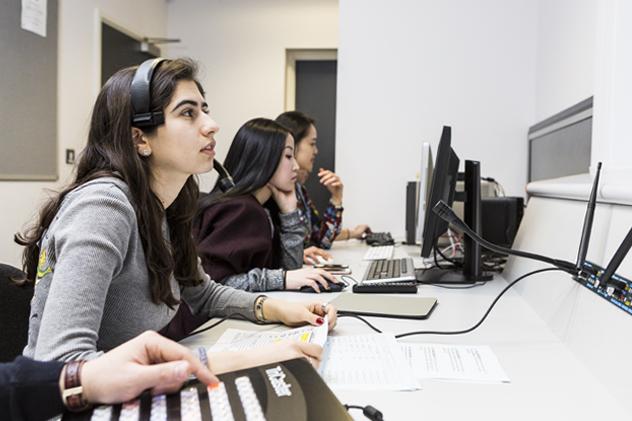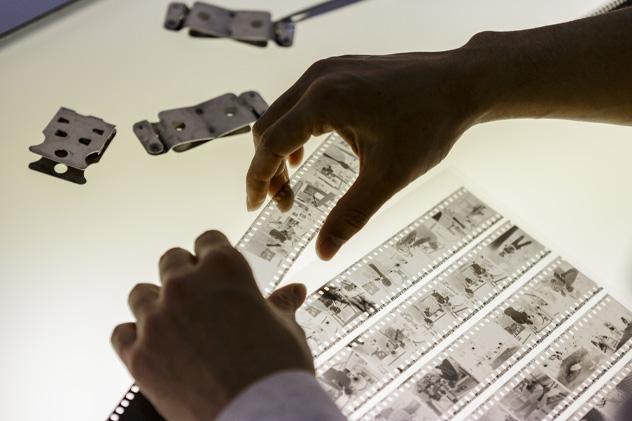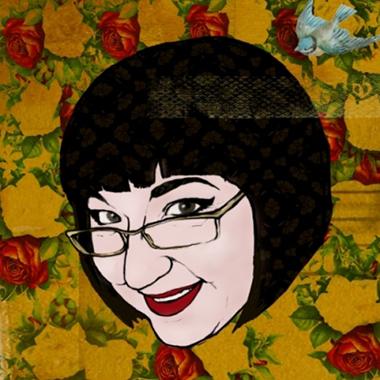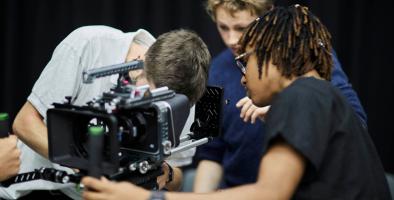Integrated Degree
Media & Communications (including Foundation Year)
Content navigation menu
Why study the Integrated Degree in Media & Communications at Goldsmiths
This is a four-year degree. If you successfully achieve the progression requirements of the Foundation Year, you can continue with the full-time three-year BA (Hons) Media & Communications degree.
- There are no formal entry requirements for this programme, you just need to demonstrate a lively interest in the world of the media – so it's an ideal choice if you're returning to education or don't have the qualifications to apply directly to the BA Media & Communications degree.
- You'll develop an understanding of media theory and media practice, and the confidence, skills and creative foundation to thrive at undergraduate level.
- You'll begin to develop production skills in TV and video, radio, video animation and photography, and create small-scale projects where you'll hone your technical and collaboration skills.
- The programme includes a study skills module, where you'll get to develop your academic writing and research skills.
- You'll be taught by highly experienced tutors and technicians in studio settings, using the same industry-standard facilities as the undergraduate degrees.
Contact the department
If you have specific questions about the degree, contact Ceiren Bell.
UCAS code
PP39
Length
1 year (Foundation) + 3 years (undergraduate degree) full-time
Fees
Home - full-time: £9250
International - full-time: £20840
Department
Watch videos about your course
What you'll study
Your Foundation Year counts as the 'Year 0' of the four-year Integrated Degree. It is structured into the following three areas:
Learning to Learn (Study Skills)
These two-hour weekly sessions are designed to help you develop the skills you will need to thrive in undergraduate study. They cover aspects of academic practice, such as how to:
- Write for academic purposes
- Approach an essay question
- Get organised
- Read and make notes effectively
- Cite your source material
- Compile a bibliography
The sessions include access to an academic tutor who is available for one-to-one tutorial sessions.
An Introduction to Media and Cultural Theory
On this module, you'll be introduced to the key traditions and foundational theories of media and cultural studies. These will help you develop an understanding of the relationship between media forms, institutions and our societies.
You will also be encouraged to develop critical thinking skills, begin to understand the importance of the relationship between media theory and practice, and demonstrate your growing skills in academic writing (with the help of the weekly 'Learning to Learn' sessions). Each week there is a lecture on a particular topic, accompanied by set reading, which you are asked to discuss in more detail in our weekly seminars.
The first part of this module introduces you to some of the important key thinkers in media theory and considers elements such as:
- The relationship between media ownership and control
- Competing debates around resistance to dominant ideologies, the power of the audience, and the arguable 'effects' of media
- Questions around the meaning of 'culture' and the history of cultural studies
- Concepts concerned with the coding and decoding of media texts
These are designed to give you a sound basis for moving on to contemporary ideas about the media as you progress through the year.
The second part of the module considers the social and cultural dimensions of the media in more detail. We will discuss and explore further:
- The role of the ‘culture industries’
- The relationship between culture and sociological categories of class, race, sexuality and gender
- Moral panics
- The study of subcultures
- Feminist perspectives of soap operas
- Studies of celebrity
- Ways of seeing
- Popular cultural representations of the city
Your own experiences and identities will be central to the concepts and ideas you are studying in these sessions.
Media Practice
Media practice gives you the opportunity to create small-scale projects in TV and video, radio, stop motion animation and photography. You will have the opportunity to work through your ideas from conception to finished product, begin to develop production skills, and understand the importance of teamwork and the sharing of ideas.
You are taught in groups for TV and video, radio and stop motion animation and individually for photography. These 5-week ‘taster’ modules are taught by highly experienced tutors and technicians in studio settings, and use the same industry-standard facilities as the undergraduate degrees.
Teaching style
The four-year Integrated Degree in Media & Communications is taught through a mixture of lectures, seminars, screenings, and workshops. You’ll also be expected to undertake independent study. This includes carrying out required and additional reading, preparing topics for discussion, and producing essays or project work.
How you'll be assessed
The pass mark for this Foundation Year is 50%. However, students must achieve 60% in all sections of the programme to proceed onto the BA Media and Communications. Students achieving between 50%-60% will be awarded the Goldsmiths Foundation Certificate in Media and Communications. You’ll be assessed by a variety of methods, depending on your module choices. These may include coursework assignments such as extended essays, reports, presentations, practice-based projects or essays/logs, group projects and reflective essays, as well as seen and unseen written examinations.

Whether you want to work in TV, radio, animation or photography, at Goldsmiths you'll have access to industry-standard facilities.

You'll get to develop practice skills in various areas, alongside the media and cultural theory to connect them to their wider societal context.
Careers
Each year graduating students from the BA Media & Communications find work in the fields of:
- Television
- Radio
- The press
- Publishing
- Film-making
- Advertising
- Marketing
- Public relations
- Web design
- Teaching and research
- Arts and administration
- Culture and heritage
You can find out more about career options after graduating on our media and communications careers page.
Skills
If you successfully achieve the progression requirements of the Foundation Year, you can continue with the full-time three-year BA Media & Communications degree, which will enable you to develop the following skills:
- Critical and analytical skills
- Proficiency in assessing evidence and in expressing ideas clearly
- The ability to bring together insights from a range of subjects
- Research skills
- Interpersonal skills, including an ability to work with others in the creative process
- Communication skills
- Journalistic and creative writing skills
- IT skills
- The confidence to work independently
Entry requirements
There are no formal entry requirements for this programme, but you should demonstrate an interest in and aptitude for the subject in your personal statement.
We’ll pay particularly careful attention to your personal statement, which is your opportunity to demonstrate your interest in the subject you’ve applied for. Your referees are also welcome to include any relevant contextual comments around your academic achievements. We’ll look at all these things when making a decision on your application.
International qualifications
We accept a wide range of international qualifications. Find out more about the qualifications we accept from around the world.
If English isn’t your first language, you will need an IELTS score (or equivalent English language qualification) of 6.0 with a 6.0 in writing and no element lower than 5.5 to study this programme. If you need assistance with your English language, we offer a range of courses that can help prepare you for degree-level study.
Fees and funding
Annual tuition fees
These are the UG fees for students starting their programme in the 2024/2025 academic year.
- Home - full-time: £9250
- International - full-time: £20840
If your fees are not listed here, please check our undergraduate fees guidance or contact the Fees Office, who can also advise you about how to pay your fees.
It’s not currently possible for international students to study part-time if you require a Student Visa, however this is currently being reviewed and will be confirmed in the new year. Please read our visa guidance in the interim for more information. If you think you might be eligible to study part-time while being on another visa type, please contact our Admissions Team for more information.
If you are looking to pay your fees please see our guide to making a payment.
Funding opportunities
We offer a wide range of scholarships and bursaries, and our Careers Service can also offer advice on finding work during your studies. Find out more about funding your studies with us.
Additional costs
In addition to your tuition fees, you'll be responsible for any additional costs associated with your course, such as buying stationery and paying for photocopying. You can find out more about what you need to budget for on our study costs page.
There may also be specific additional costs associated with your programme. This can include things like paying for field trips or specialist materials for your assignments. Please check the programme specification for more information.





